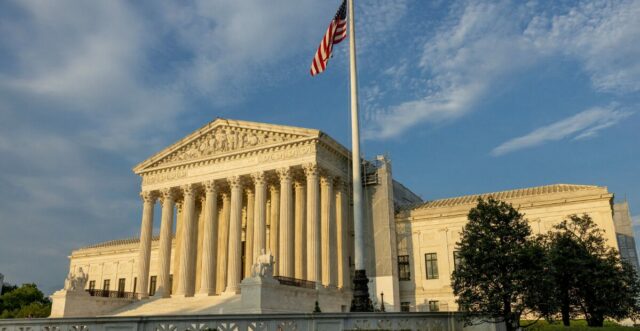The U.S. Supreme Court has agreed to decide whether the Nuclear Regulatory Commission is authorised to license nuclear waste storage facilities following a judicial ruling.
Does NRC Have The Authority?
The ruling upended decades of practice by declaring that the Nuclear Regulatory Commission does not have this authority.
The justices took up appeals by President Joe Biden’s administration and a company that was awarded a license.
The NRC had given license to the company to build a waste storage facility in western Texas of the lower court’s ruling.
Who Has Challenged The License?
The states of Texas and New Mexico, as well as oil industry interests challenged the license.
The Supreme Court will hear arguments in the case in its new term, which begins on Monday.
When Is The Decision Expected?
The decision is expected by the June end.
The Supreme Court, which has a 6-3 conservative majority, has shown skepticism toward the authority of federal regulatory agencies.
The NRC which is tasked with regulating nuclear energy in the United States, issued the license in 2021 to Interim Storage Partners.
Interim Storage Partners is a joint venture of France-based Orano and Dallas-based Waste Control Specialists.
While two other federal appeals courts rejected legal challenges to the license, the New Orleans-based 5th U.S. Circuit Court of Appeals ruled in favour of the plaintiffs.
Does NRC Have Authority?
It decided that the NRC lacked authority under a federal law called the Atomic Energy Act of 1954 to issue the license at all.
The administration has said the ruling would disrupt the nuclear energy sector.
In its appeal to the Supreme Court, it argued that the 5th Circuit had imposed “novel” limits on the NRC’s authority.
These “will have serious repercussions for the commission and the nuclear-power industry.”
Appeal By The Administration
The administration’s appeal has the support of the nuclear energy industry’s trade association, the Nuclear Energy Institute.
The institute said that the 5th Circuit’s ruling would have “far-reaching and destabilizing” effects on the sector.
The NRC has issued licenses like the one at issue in this case for the temporary storage of spent fuel produced by nuclear reactors since 1980.
The NRC recognizes that the nuclear-power industry would need more space for the off-site storage of the radioactive waste.
It did so pursuant to its authority under the Atomic Energy Act to issue licenses to possess nuclear material.
Proposal For Permanent Storage Of Nation’s Radioactive Waste
Such sites continue to be licensed.
There is also a proposal to permanently store the nation’s radioactive waste at Yucca Mountain north of Las Vegas stalled following decades of opposition in Nevada.
In the 5th Circuit ruling against the license, Judge James Ho, an appointee of Republican former President Donald Trump, cited a different law, the Nuclear Waste Policy Act.
Amendment Of The Act
This Act was amended in 1987 to designate Yucca as the sole permanent storage site for such radioactive waste.
In the ruling against the NRC, Ho also invoked the so-called “major questions” doctrine favored by conservative jurists and embraced by the Supreme Court.
Interim Storage Partners planned to operate its nuclear storage facility in Andrews County, Texas.
Who Has Opposed The Plan?
Oil- and gas-related organizations have opposed the plan because the facility would be operated within the Permian Basin.
The Permian Basin is the highest-producing oil field in the country.
A Texas-based oil and gas extraction organization, and a nonprofit group have joined the litigation challenging the license by Fasken Land and Minerals,
The plaintiffs argued that permission for building the proposed facility would pose environmental risks to watersheds covering nearly all of New Mexico and Texas.
They said that a radiation leak could be economically disastrous for oil and gas operations.
(With inputs from Reuters)
Delhi based journalist pickled in journalism. Have reported from nine world capitals and almost all parts of India. Over the last three decades, I have worked for India’s mainstream English dailies and contributed to All India Radio, Doordarshan and Women’s Feature Service. Also worked for international media including Japan’s leading newspaper, The Asahi Shimbun and done assignments for The Sunday Times, London, The Telegraph, The Guardian and the Canadian Broadcasting Corporation. Worked in the Embassy of France in New Delhi and can speak French to save my life. Write on Diplomacy, Politics and the social sector. Love Nature, heritage, Nature, animals and vintage cars. Enjoy cycling and playing badminton.





